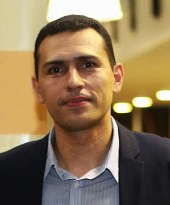The ROC team is hosting two invited professors from UFMG, Brazil and another invited professor from University of Chlef, Algeria: Michele Nogueira, Aldri Santos and TAHAR ABBES Mounir, who will deliver three talks on June 14 at 2 p.m. A new postdoc, Guilherme Iecker Ricardo, will complete the day with a presentation on disaggregated RAN orchestration. A Brazilian buffet will end the seminars.
Room: amphi “Gaston planté” (2 rue conté, 35.1.39).
Speaker: Michele Nogueira, Federal University of Minas Gerais (UFMG), Brazil

Title: Data Science for Cybersecurity: An Overview Focused on Networking
Abstract:
Cyberattacks persistently pose threats to valuable data, resulting in time and resource wastage, and damaging the reputation of companies and institutions worldwide. Even prominent organizations have experienced the severe consequences of cyberattacks, impacting not only themselves but also their customers, collaborators, and society at large. Ransomware such as WannaCry continues to pose a significant threat, encrypting data and demanding ransom payments in Bitcoin cryptocurrency. Furthermore, sophisticated versions of Distributed Denial-of-Service (DDoS) attacks, originating from various Internet-connected devices like IP cameras, residential gateways, and baby monitors, disrupt major Internet platforms and services, affecting users globally. These examples underscore the increasing power and sophistication of cyberattacks, highlighting the evolving nature of cybersecurity. In the era of ubiquitous systems, with an estimated 75 billion connected devices or “smart things” expected by 2025, the urgency to address these issues is apparent. However, academia’s role in combating the sophistication of cyberattacks remains a crucial aspect. Can academia effectively anticipate attackers’ next moves to safeguard our information assets? How can academia harness the data generated on networks to develop security intelligence and preemptively prevent attacks? This presentation aims to initiate a discussion surrounding these questions, providing an overview of the related research conducted by Dr. Nogueira’s research team, along with future directions in these areas.
Bio:
Michele Nogueira is an Associate Professor in the Computer Science Department at Federal University of Minas Gerais (UFMG), Brazil. She received her doctorate in Computer Science from the University Pierre et Marie Curie – Sorbonne Université, France. She was on a sabbatical leave at Carnegie Mellon University, USA (2016-2017). Her research interests include wireless networks, security, and dependability. She has worked on providing resilience to self-organized, cognitive and wireless networks by adaptive and opportunistic approaches. Dr. Nogueira was one of the pioneers in addressing survivability issues in self-organized wireless networks, being the work “A Survey of Survivability in Mobile Ad Hoc Networks”, one of her prominent scientific contributions. She has been a recipient of Academic Scholarships from Brazilian Government in her undergraduate and graduate years; and of international grants such as the ACM SIGCOMM GeodiversityAldri Santos program. She has served as Associate Technical Editor for the IEEE Communications Magazine. She served as chair for the IEEE ComSoc Internet Technical Committee, and she is an ACM and IEEE Senior Member.
Speaker: Aldri Santos, Federal University of Minas Gerais (UFMG), Brazil

Title: Resilience for Critical Services in Dense Networks
Abstract:
Society has sped up digitization in many areas, increasing the number of users and devices connected to networks and demanding faster services to support compute-intensive and time-sensitive applications. Further, the development of other technologies characterized by mobility, such as autonomous vehicles, Unmanned Aerial Vehicles (UAV), and High Altitude Platforms (HAP), has improved connectivity services, also providing services over uncovered or under-served geographical areas. In this context, the integration and interconnection of several existing networks, including Internet of Things environments, will allow the connection of a myriad of heterogeneous devices to the Internet and enable the creation of dense networks, with various critical application domains. These networks also experience several disruptions, like attacks and equipment failures. This talk will present an overview of dense networks, and the existing resilience concepts, and also will briefly about some cases to support dense network operation.
Bio:
Aldri Santos is a Full Professor in the Computer Science Department at the Federal University of Minas Gerais (UFMG), Brazil. He holds a Ph.D. in Computer Science (2004) from the Federal University of Minas Gerais, a Master’s degree in Informatics (1999) and a Bachelor’s degree in Informatics (1995) from UFPR. He has been dedicated to research in the area of network management, fault tolerance, security, data dissemination, IoT networks, UAVs, VANETs, WBANs, Cyber-Physical Systems, and dense networks. Aldri has coordinated national and international research projects, participated in national and international symposia program committees, acted as a reviewer for journals and funding projects, and in the organization of national and international scientific events. He is an associate editor of the IEEE journal Transactions on Network and Service Management (TNSM). He served as the coordinator of the Special Commission on Information and Computer Systems Security (CESeg) of the SBC in the biennium (2014-2016) and vice-coordinator in the biennium (2012-2014). He is a member of the Communications and Information Security Technical Committee of the IEEE Communications Society (ComSoc), the SBC, the IEEE, and the ACM. Member of the Brazilian Computer Society Commission for Proposing the Training Framework for Bachelor’s Degree courses in Cybersecurity.
Speaker: TAHAR ABBES Mounir, Hassiba Ben Bouali University in Chlef, Algeria
Title: Formal validation of wireless network protocol
Abstract:
The development of protocols in WSN with high quality requires the use of rigorous techniques. the latter must ensure that the developed systems satisfies the properties that reflect the requirements expressed in the specifications. in recent years, both the increased use of embedded system and the detection of anomalies with respect to Ariane Flight 501 have made it necessary to evolve the software production process to improve its reliability. For the reasons mentioned before, formal methods are becoming increasingly important in the field of wireless sensor networks (WSN). A formal specification of the system is based on a formal language whose semantics are well defined.
This study aims to build models using formal methods that can efficiently show the complex parts of the protocols used in OSI network layer, detect and fix bugs before implementing the protocol in real scenarios. In this paper, we will present and elaborate our models in Application, Network, transport and MAC Layer using a combined strategies between coloured Petri Network (CPN) and Event-b method, while our proofs are carried out using the event-b tool platform. And this will save a lot of time and avoid wasting materials sometimes very expensive.
Bio:
TAHAR ABBES Mounir is a professor at Hassiba Ben Bouali University, Chlef, Algeria, where he joined as a faculty member in September 2008. He leads the faculty of science and computer science as dean. Prior to that, he spent ten years as an assistant and then an associate professor at the same university. He was a visiting professor at Poitiers University in France. Visiting Researcher at the Department of Computer Science, CNAM, France. He is also involved in postgraduate research programs in computer science at several universities and schools in Algeria and Tunisia.
Mr. TAHAR ABBES Mounir, received the Master’s degree in science and computer from the University of Poitiers (ENSMA, France) in 2003, PHD from the University of Oran in Algeria.
Mounir has participated in the TNT European project (The Neanderthals: Transforming Representational Cultural Heritage into Digital Media Popular Scientific Content and Developing a Visual Simulation Engine for Collaborative Real-Time Exploration) from CNRS-France in collaboration with Pr. Roberto Macchiarelli (2004–2006), and from 2006–2008 worked as GSM core network consulting in MSI-Consultancy in many GSM projects in collaboration with Mr. Manpal Ghatura, He is currently completing his research in computer science and telecommunication at Hassiba Ben Bouali University in Chlef, Algeria.
Speaker: Guilherme Iecker Ricardo
Title: Joint Optimization of UE-RU Association and CU-DU Placement in vRAN
Abstract:
In modern mobile network architectures, Radio Access Networks (RANs) have virtualized network functions and different components of the protocol stack that may be implemented in different
physical nodes, which provides flexibility, scalability, and interoperability.
In this introductory talk, we explore this disaggregated virtualized RAN (vRAN) architecture in order to improve network performance and meet specific user experience requirements by efficiently and automatically managing network resources. Particularly, we will discuss how to jointly optimize User Equipment (UE)-Radio Unit (RU) association and Central Unit (CU)-Distributed Unit (DU) placement and the underlying constraints and challenges. We propose to tackle this problem using a set of techniques ranging from classic optimization to machine learning.
Bio:
Guilherme Iecker Ricardo is a postdoctoral fellow with the ROC team at CEDRIC/CNAM and a university lecturer at Université Paris Dauphine (France). In 2021, he received a Ph.D. degree in Computer Science from Université Côte d’Azur (France), having EURECOM and Inria – Sophia Antipolis as hosting research institutions. He received a bachelor degree in Computer Engineering, in 2016, and a M.Sc. degree in Computer Science, in 2018; both from Universidade Federal do Rio de Janeiro (Brazil). From January 2022 to April 2023, he was with the MORE research department at Orange Labs as a postdoctoral fellow. His research interests are in the modeling and optimization of networked systems, especially applications of edge computing technologies to communication networks. His approaches include classic and stochastic optimization as well as statistical learning techniques.

